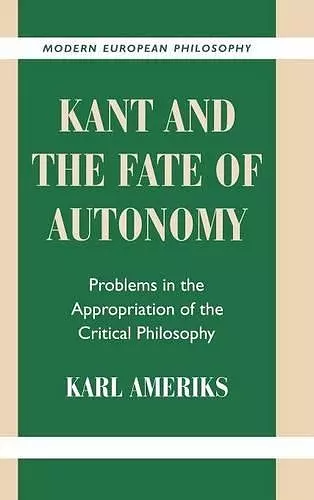Kant and the Fate of Autonomy
Problems in the Appropriation of the Critical Philosophy
Format:Hardback
Publisher:Cambridge University Press
Currently unavailable, and unfortunately no date known when it will be back
This hardback is available in another edition too:
- Paperback£36.99(9780521786140)

Ameriks challenges the presumptions that dominate popular approaches to the concept of freedom.
By providing the first study of the structure of the reaction to Kant's critical philosophy in the writings of Reinhold, Fichte and Hegel, Ameriks challenges the presumptions that dominate popular approaches to the concept of freedom, and to the interpretation of the relation between the Enlightenment, Kant and post-Kantian thought.It has been argued that Kant's all-consuming efforts to place autonomy at the center of philosophy have had, in the long-run, the unintended effect of leading to the widespread discrediting of philosophy and of undermining the notion of autonomy itself. The result of this 'Copernican revolution' has seemed to many commentators the de-centring, if not the self-destruction, of the autonomous self. In this major reinterpretation of Kant and the post-Kantian response to his critical philosophy, Karl Ameriks argues that such a view of Kant rests on a series of misconceptions. By providing the first systematic study of the underlying structure of the reaction to Kant's critical philosophy in the writings of Reinhold, Fichte and Hegel, Karl Ameriks challenges the presumptions that dominate popular approaches to the concept of freedom, and to the interpretation of the relation between the Enlightenment, Kant and post-Kantian thought.
"...[a] marvelous and provocative book..." Inquiry
"What a pleasure to encounter a book on Kant and the Post-Kantians written with passion as well as erudition." Inquiry
Amerik's book is rich, rewarding, and detailed. He combines a mastery of the German and English material...with a fine historical sensibility, a gift for clear writing, and a sharp analytical mind. He also displays a scrupulous intellectual honesty, claiming clear advantages for the 'modest' approach to Kant while noting and discussing the shortcomings of that approach." Ethics
ISBN: 9780521781015
Dimensions: 237mm x 158mm x 30mm
Weight: 625g
366 pages